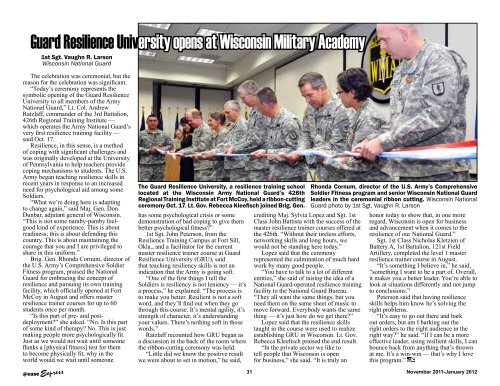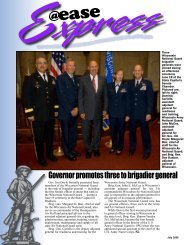November 2011-January 2012 - Wisconsin National Guard ...
November 2011-January 2012 - Wisconsin National Guard ...
November 2011-January 2012 - Wisconsin National Guard ...
Create successful ePaper yourself
Turn your PDF publications into a flip-book with our unique Google optimized e-Paper software.
1st Sgt. Vaughn R. Larson<strong>Wisconsin</strong> <strong>National</strong> <strong>Guard</strong>The celebration was ceremonial, but thereason for the celebration was significant.“Today’s ceremony represents thesymbolic opening of the <strong>Guard</strong> ResilienceUniversity to all members of the Army<strong>National</strong> <strong>Guard</strong>,” Lt. Col. AndrewRatzlaff, commander of the 3rd Battalion,426th Regional Training Institute —which operates the Army <strong>National</strong> <strong>Guard</strong>’svery first resilience training facility —said Oct. 17.Resilience, in this sense, is a methodof coping with significant challenges andwas originally developed at the Universityof Pennsylvania to help teachers providecoping mechanisms to students. The U.S.Army began teaching resilience skills inrecent years in response to an increasedneed for psychological aid among someSoldiers.“What we’re doing here is adaptingto change again,” said Maj. Gen. DonDunbar, adjutant general of <strong>Wisconsin</strong>.“This is not some namby-pamby feelgoodkind of experience. This is aboutreadiness; this is about defending thiscountry. This is about maintaining thecourage that you and I are privileged toshare in this uniform.”Brig. Gen. Rhonda Cornum, director ofthe U.S. Army’s Comprehensive SoldierFitness program, praised the <strong>National</strong><strong>Guard</strong> for embracing the concept ofresilience and pursuing its own trainingfacility, which officially opened at FortMcCoy in August and offers masterresilience trainer courses for up to 60students once per month.“Is this part of pre- and postdeployment?”she asked. “No. Is this partof some kind of therapy? No. This is justmaking people more psychologically fit.Just as we would not wait until someoneflunks a [physical fitness] test for themto become physically fit, why in theworld would we wait until someone@easeExpressThe <strong>Guard</strong> Resilience University, a resilience training schoollocated at the <strong>Wisconsin</strong> Army <strong>National</strong> <strong>Guard</strong>’s 426thRegional Training Institute at Fort McCoy, held a ribbon-cuttingceremony Oct. 17. Lt. Gov. Rebecca Kleefisch joined Brig. Gen.has some psychological crisis or somedemonstration of bad coping to give thembetter psychological fitness?”1st Sgt. John Peterson, from theResilience Training Campus at Fort Sill,Okla., and a facilitator for the currentmaster resilience trainer course at <strong>Guard</strong>Resilience University (GRU), saidthat teaching resiliency skills is not anindication that the Army is going soft.“One of the first things I tell theSoldiers is resiliency is not leniency — it’sa process,” he explained. “The process isto make you better. Resilient is not a softword, and they’ll find out when they gothrough this course. It’s mental agility, it’sstrength of character, it’s understandingyour values. There’s nothing soft in thosewords.”Ratzlaff recounted how GRU began asa discussion in the back of the room wherethe ribbon-cutting ceremony was held.“Little did we know the positive resultwe were about to set in motion,” he said,crediting Maj. Sylvia Lopez and Sgt. 1stClass John Battista with the success of themaster resilience trainer courses offered atthe 426th. “Without their tireless efforts,networking skills and long hours, wewould not be standing here today.”Lopez said that the ceremonyrepresented the culmination of much hardwork by many good people.“You have to talk to a lot of differententities,” she said of raising the idea of a<strong>National</strong> <strong>Guard</strong>-operated resilience trainingfacility to the <strong>National</strong> <strong>Guard</strong> Bureau.“They all want the same things, but youneed them on the same sheet of music tomove forward. Everybody wants the samething — it’s just how do we get there?”Lopez said that the resilience skillstaught in the course were used to realizeestablishing GRU in <strong>Wisconsin</strong>. Lt. Gov.Rebecca Kleefisch praised the end result.“In the private sector we like totell people that <strong>Wisconsin</strong> is openfor business,” she said. “It is truly anRhonda Cornum, director of the U.S. Army’s ComprehensiveSoldier Fitness program and senior <strong>Wisconsin</strong> <strong>National</strong> <strong>Guard</strong>leaders in the ceremonial ribbon cutting. <strong>Wisconsin</strong> <strong>National</strong><strong>Guard</strong> photo by 1st Sgt. Vaughn R. Larsonhonor today to show that, in one moreregard, <strong>Wisconsin</strong> is open for businessand advancement when it comes to theresilience of our <strong>National</strong> <strong>Guard</strong>.”Sgt. 1st Class Nicholas Kletzien ofBattery A, 1st Battalion, 121st FieldArtillery, completed the level 1 masterresilience trainer course in August.“It’s something I believe in,” he said,“something I want to be a part of. Overall,it makes you a better leader. You’re able tolook at situations differently and not jumpto conclusions.”Peterson said that having resilienceskills helps him know he’s solving theright problems.“It’s easy to go out there and barkout orders, but am I barking out theright orders to the right audience in theright way?” he said. “If I can be a moreeffective leader, using resilient skills, I canbounce back from anything that’s thrownat me. It’s a win-win — that’s why I lovethis program.”31 <strong>November</strong> <strong>2011</strong>-<strong>January</strong> <strong>2012</strong>





